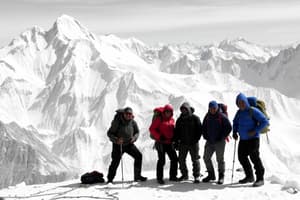Podcast
Questions and Answers
What was the most dominant feeling experienced by Ahluwalia upon reaching the summit of Everest?
What was the most dominant feeling experienced by Ahluwalia upon reaching the summit of Everest?
- Disappointment
- Exhaustion
- Humility (correct)
- Triumph
According to Ahluwalia, the return journey from the summit is typically less dangerous than the ascent.
According to Ahluwalia, the return journey from the summit is typically less dangerous than the ascent.
False (B)
Besides the physical challenge, what other significant type of challenge motivates climbers?
Besides the physical challenge, what other significant type of challenge motivates climbers?
mental
Ahluwalia felt a trace of ____ upon reaching the summit, questioning if he had reached life's ultimate peak.
Ahluwalia felt a trace of ____ upon reaching the summit, questioning if he had reached life's ultimate peak.
Match the phrases with the correct motivational factor for climbing mountains:
Match the phrases with the correct motivational factor for climbing mountains:
Why is Everest considered to have a unique appeal to climbers?
Why is Everest considered to have a unique appeal to climbers?
Ahluwalia found definitive answers to his reasons for climbing Everest after the experience.
Ahluwalia found definitive answers to his reasons for climbing Everest after the experience.
Physical conquest of a mountain is only part of the achievement. What is the other part?
Physical conquest of a mountain is only part of the achievement. What is the other part?
What do climbers often leave on Everest as a sign of their experience?
What do climbers often leave on Everest as a sign of their experience?
Conquering the internal summit is equally worthwhile, perhaps even ________ than conquering Everest itself.
Conquering the internal summit is equally worthwhile, perhaps even ________ than conquering Everest itself.
Flashcards
Initial Feeling on Everest's Summit
Initial Feeling on Everest's Summit
A feeling of humbleness experienced on reaching the summit of Everest.
Motivations for Climbing
Motivations for Climbing
Challenges, obstacles, testing endurance, persistence and demonstrating determination.
Everest's Unique Appeal
Everest's Unique Appeal
Highest and most challenging peak, brutal struggle against rock and ice, demands all energy with no turning back.
Internal Conquest
Internal Conquest
Signup and view all the flashcards
The Climbing Experience
The Climbing Experience
Signup and view all the flashcards
Symbols and Respect
Symbols and Respect
Signup and view all the flashcards
The Inner Summit
The Inner Summit
Signup and view all the flashcards
Lasting Impact
Lasting Impact
Signup and view all the flashcards
Study Notes
Overview
- The chapter explores both external and internal challenges humans face.
- Focuses on Major HPS Ahluwalia's experience as part of the first successful Indian expedition to Mount Everest in 1965.
- The narrative delves into physical and mental challenges of climbing, and the profound impact it had on him.
Initial Feelings on the Summit
- Upon reaching the summit of Everest, Ahluwalia experienced a dominant feeling of humility.
- Despite the physical achievement, he felt a trace of sadness, questioning if he had reached the ultimate peak, leaving nothing higher to climb.
- Climbing Everest brings overwhelming joy and thankfulness, which lasts a lifetime, changing a person.
Introspection After the Climb
- After descending, Ahluwalia questioned his reasons for climbing Everest and the impact of this achievement on his imagination.
- He considered the fleeting nature of memories and pondered what would remain of the experience.
- This introspection led him to question the motivations behind mountain climbing in general.
Motivations for Climbing
- The simplest answer to why people climb mountains is "because it is there".
- Challenges and obstacles, both physical and mental, are major motivations for climbers.
- Climbing tests endurance, persistence, and determination, which are exhilarating to demonstrate.
- Ahluwalia had a personal attraction to mountains since childhood, finding solace and connection with nature in them.
- Many view mountains as a means of communion with God.
Everest's Unique Appeal
- Everest is the highest and most challenging peak, having resisted many previous attempts.
- The climb demands every ounce of energy and is a brutal struggle against rock and ice.
- Once committed, there's no turning back, even when life is at stake, as the return journey is as dangerous as the ascent.
- Reaching the summit brings immense exhilaration, a sense of victory, and profound happiness.
- The author describes being transported to another world, experiencing a mystical challenge within himself.
Unanswerable Questions
- Ahluwalia reflects on the difficulty of fully explaining his reasons for climbing Everest.
- He compares it to fundamental human actions like breathing or helping others, for which there are no definitive answers.
- Climbing Everest made him aware of his insignificance in the vast universe.
Internal Conquest
- Physical conquest of a mountain is only part of the achievement.
- There is a sense of fulfillment and satisfaction in overcoming one's limitations.
- The experience transcends the physical, becoming emotional and spiritual.
The Climbing Experience
- Climbers often share ropes and support each other, cutting steps into the ice for progress.
- The climb strains every nerve, making even breathing difficult, leading to moments of self-doubt.
- Despite the urge to give up, an inner resolve keeps climbers going.
- Inspiration is drawn from fellow climbers, leading to the summit.
- The view from the top validates the effort, revealing silvery peaks and vast valleys.
Symbols and Respect
- Climbers often leave symbols of their faith on Everest, such as pictures or relics.
- These are expressions of reverence, not conquest.
- The act of climbing changes a person, revealing an inner summit within oneself that must be climbed alone.
The Inner Summit
- The internal mountain is fearful and unscalable, requiring personal effort.
- Climbing the physical mountain mirrors the internal journey, with similar transformative effects.
- Both experiences teach valuable lessons about the world and oneself.
Lasting Impact
- Ahluwalia's Everest experience has inspired him to face life's difficulties with determination.
- Conquering the internal summit is equally worthwhile, perhaps even greater than conquering Everest itself.
Studying That Suits You
Use AI to generate personalized quizzes and flashcards to suit your learning preferences.



